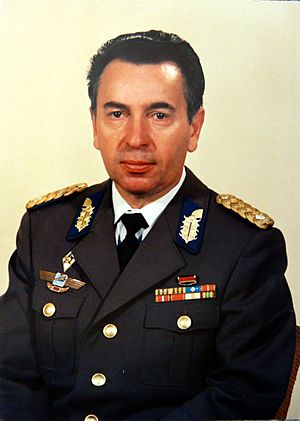Wolfgang Thonke facts for kids
Quick facts for kids
Wolfgang Thonke
|
|
|---|---|
 |
|
| Born | December 28, 1938 Schneidemühl (Piła, Province of Pomerania DR) |
| Died | 21 January 2019 (aged 80) Strausberg (Brandenburg, DE) |
| Allegiance | |
| Service/ |
|
| Years of service | 1957–1990 |
| Rank | |
| Commands held |
|
| Awards |
|
Wolfgang Thonke (born December 28, 1938 – died January 22, 2019) was an important military leader in the former East Germany. He was a journalist and a highly educated military scientist. He reached the rank of major general.
Thonke was the last Deputy Commanding General for the Air Force in East Germany. He was a top-level military pilot, flying for over 1,500 hours. This means he spent a lot of time in the air!
Contents
Wolfgang Thonke's Early Life and Military Path
Growing Up and Moving
Wolfgang Thonke was born in Schneidemühl, which is now Piła, Poland. He grew up in a working-class family. After World War II, his family had to leave their hometown. They moved to relatives in Bautzen, a city in Germany.
Joining the Army
After finishing high school, Thonke decided to join the National People's Army in 1957. He volunteered to become a professional soldier. He then applied to study at the Air Force Officer's School in Bautzen. In 1958, he became a member of the Socialist Unity Party of Germany, which was the main political party in East Germany at the time.
Becoming a Flight Instructor
Thonke graduated with honors from the officer's school in 1959. He became a professional officer and started working as a flight instructor. He taught new pilots at the 3rd Fliegerausbildungsgeschwader (a flight training unit). From 1961 to 1965, he was an instructor for flight tactics and weapon control. He worked at the Rotenburg/Görlitz airfield.
Rising Through the Ranks
Because he was excellent at teaching and flying, Thonke was promoted to captain. In 1963, he became the A3 (a staff position focused on operations) for the Air Force Officer's School.
From 1968 to 1973, he served as the deputy commander for flight training at the same school. He did so well in this role that he was chosen to attend a special high-level military study program.
Advanced Military Studies
From 1973 to 1975, Thonke studied at the Friedrich Engels Military Academy in Dresden. He passed all his exams with top marks and earned a degree in military science. This means he became an expert in how armies work and fight.
After his studies, he was promoted to lieutenant colonel. He then became the Commander of the Jagdfliegergeschwader 1 (JG-1), which was a fighter squadron, from 1973 to 1975.
He continued his advanced training from 1975 to 1977 at the General Staff Academy (Russia). After this, he earned a doctorate in military science. He was promoted to colonel and became the chief of the flight inspection department for the Air Force command (Kommando LSK/LV).
| Promotions |
|---|
|
In 1981, he became the A3 (operations chief) for fighter aircraft units. Later, he became the commander of the fighter aircraft units within the Air Force command. He held this important position until 1986.
Service as a General
In 1986, Wolfgang Thonke was appointed commander of the Officers high school „Otto Lilienthal” in Bautzen. On October 7, 1987, he was promoted to major general.
His last job as a general was from 1989 to 1990. He served as the Assistant Commander in Chief A3 of the Air Force in Strausberg. This was a very high-ranking role, helping to lead the entire Air Force.
Retirement
When the National People's Army was dissolved, Major General Thonke retired. His retirement became official on October 2, 1990.
Awards and Honors
Wolfgang Thonke received many awards and decorations for his service. Some of them include:
- Patriotic Order of Merit, in bronze
- Combat order "Of Merit for the Nation and Fatherland", in silver and bronze
- Meritorious Military Pilot of the German Democratic Republic (a special award for top pilots)
- Medal of Merit of the National People's Army, in gold, silver, and bronze
- Medal Brotherhood in Arms, in silver
- Medal "For Strengthening of Brotherhood in Arms"
- Medal for the 30th Anniversary of the Foundation of the GDR
- Medal for Faithful Service in the National People's Army (for long service)
Personal Life
After retiring from the military in 1990, Dr. Wolfgang Thonke worked as a freelance journalist. He was also a member of the Fliegerstammtisch Strausberg, a group for pilots. He passed away on January 22, 2019, and was buried in the St. Marine churchyard in Strausberg on March 1, 2019. He is survived by his wife, Karin, and their three children.

